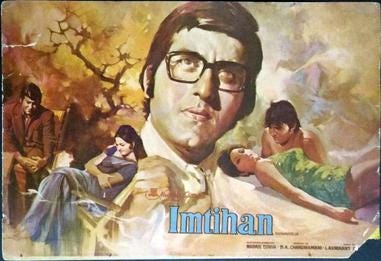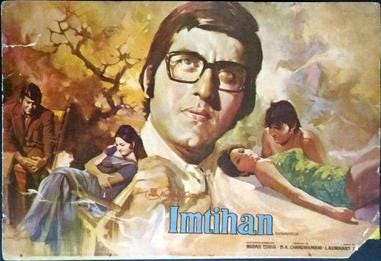Here is another Hindi song from the 70s that I like.
For translation help, I referred to this video on YouTube. I’m still not sure that I got everything correct - there were some lines for which my initial translation attempt was way off compared to the video (I usually deferred to the latter). As usual, I have jotted down some notes at the end of the post.
Song: Ruk Jana Nahin
Film: Imtihan (1974)
Lyricist: Majrooh Sultanpuri
Music: Laxmikant-Pyarelal
Singer: Kishore Kumar
रुक जाना नहीं तू कहीं हार के, काँटों पे चलके मिलेंगे साये बहार के
Do not stop, after being defeated; walking on the thorns, you will meet the shades of spring.
ओ राही, ओ राही
O Traveler, O Traveler!
—
सूरज देख रुक गया है, तेरे आगे झुक गया है
Look, the sun has stopped, and bows down in front of you!
जब कभी ऐसे कोई मस्ताना, निकले है अपनी धुन में दीवाना
When someone is intoxicated like this, and emerges crazed from his own obsession,
शाम सुहानी बन जाते हैं दिन इंतज़ार के
The days of waiting become pleasant evenings!
ओ राही, ओ राही
O Traveler, O Traveler!
—
साथी ना कारवाँ है, ये तेरा इंतिहान है
There is no friend or caravan, this is your test!
यूँ ही चला चल दिल के सहारे, करती है मंज़िल तुझको इशारे
Go like this, with the help of your heart; the destination is gesturing at you,
देख कहीं कोई रोक नहीं ले तुझको पुकार के
Look, no one can call out and stop you!
ओ राही, ओ राही
O Traveler, O Traveler!
—
नैन आँसू जो लिये हैं, ये राहों के दिये हैं
The eyes that have carried tears are the lamps that light this path
लोगों को उनका सब कुछ देके, तू तो चला था सपने ही लेके
Giving all of that to the people, you went on, taking only your dream
कोई नहीं तो तेरे अपने हैं सपने ये प्यार के
There is no one, but these dreams of love are your own
ओ राही, ओ राही
O Traveler, O Traveler!
Notes:
“मिलेंगे साये बहार के” - मिलेंगे is future plural, so it must agree with साये. This is an impersonal construction, lit. “[to you] will meet the shades of spring.”
“निकले है अपनी धुन में दीवाना” - Honestly, I’m still not sure what kind of conjugation निकले है is. It can’t be a perfective participle because then it should be निकला to agree with masculine singular दीवाना in an intransitive construction. If someone can help me out here, that would be great!
“शाम सुहानी बन जाते हैं दिन इंतज़ार के” - The verb phrase बन जाते हैं tells us that this sentence has the form “X becomes Y,” but it’s a little unclear at first what X and Y are. One might at first read out “शाम सुहानी बन जाते हैं” - “evenings become beautiful,” but that would leave the last part of the line (दिन इंतज़ार के) stranded. One has to guess that this last bit is in fact the subject of the sentence - with typical word order, the whole thing would be “इंतज़ार के दिन सुहानी शाम बन जाते हैं” - “days of waiting become beautiful evenings,” with सुहानी being an adjective of शाम. According to the video I linked, this is the correct meaning, despite the unusual word order of the line in the song.
“नैन आँसू जो लिये हैं, ये राहों के दिये हैं” - In the first half, the perfective construction लिये हैं is a conjugation of लेना and means “has carried.” In the second half, it’s tempting to think that दिये is the analogous conjugation of देना, but it’s actually the plural of the noun दिया (“lamps”).
“कोई नहीं तो तेरे अपने हैं सपने ये प्यार के” - In standard word order, this would be “कोई नहीं तो ये प्यार के सपने तेरे अपने हैं” (“There is no one, but these dreams of love are your own”).




